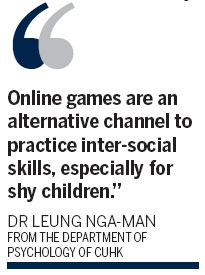Online game good for kids: CUHK
Updated: 2010-08-24 07:25
By Emma Dai(HK Edition)
|
|||||||
Online games are good for the psychological well-being of children, a Chinese University of Hong Kong (CUHK) study shows. Researchers add, however, that it would be better for there to be supervisors to keep a watch over cyber bullying.
The research shows students who play massive multi-player online games (MMO) are more likely to develop or strengthen their friendships by interacting with others.
The research suggests that MMO are the most popular games among Hong Kong teens. More than half of participants have played MMO previously. Among them, 94 percent played with both friends online and in real life.
During the survey, 626 primary grade five and six students were interviewed last winter. The researchers report finding a postive link between online friendships and social competency, friendship satisfaction, self-esteem and life satisfaction.

"The more online friendships a child experiences in the MMO context, the better the child's psychological well being would be," said Dr Leung Nga-man from the Department of Psychology of CUHK.
While 73 percent of students playing online games declare their cyber best friends are not their day-to-day best friends, the research found that the quality of friendships achieved in the MMO is only slightly less than that of real, face-to-face friendships.
"Despite the slightly lower friendship quality," Leung said, "MMO creates opportunities for early adolescents to interact with people. Working towards a common goal as a team needs cooperation, loyalty and sharing, which is the basis for the development of friendship. When they became close, they would chat like friends in day-to-day life. Online games are an alternative channel to practice inter-social skills, especially for shy children," Leung added.
Meanwhile, the research also found that more than 30 percent of online participants engage in cyber bullying. Four percent were regarded as frequent cyber bullies. The proportion of bullies in day to day situations is estimated at only 1.8 percent.
"Cyber bullying has negative impact on confidence building," said Leung. "It also has more chance to spread further as sharing is easy. Parents and teachers should be vigilant."
Boys are found to be more enthusiastic players of online games than girls. "It's not a big deal if a child plays computer games for an hour or two," Leung said. "But to stick to it for too long would not help studies. I suggest that parents play with their children to supervise."
China Daily
(HK Edition 08/24/2010 page1)